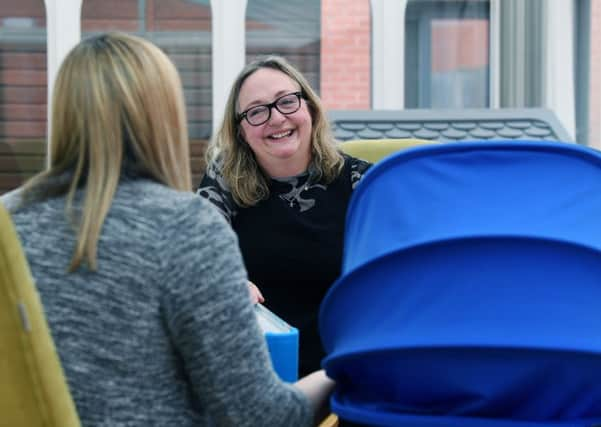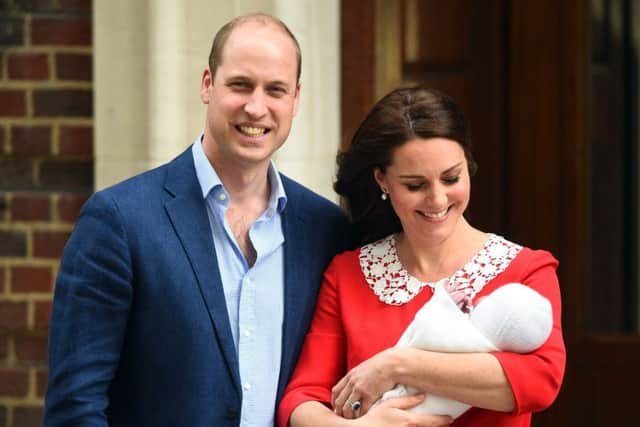How Leeds nurses and ex-patients are offering a way out of the darkness for mums with postnatal depression


Social expectations suggest having a new baby should be the happiest time in a woman’s life – but Bronwen Ashton is one of the tens of thousands of new mothers each year who have found the reality can be dramatically different.
Almost eight years ago, Bronwen found herself suffering from such serious mental health difficulties that in the weeks following the birth of her second child she feared she would die. Now recovered, she is giving back to the specialist mental health unit in Leeds which transformed her life, by sharing her experiences with recently-admitted new mums on the ward where she had to stay for three months.
Advertisement
Hide AdAdvertisement
Hide AdWhile she is very friendly and chatty now, Bronwen, from the Roundhay area of Leeds, freely admits it has been a long road to recovery and that the journey isn’t finished. But the darkest days of her illness where she believed she was close to death are fortunately long behind her – thanks both to the support of her husband and family and the tireless work of the staff at the Perinatal Mental Health Service run by the Leeds and York Partnership NHS Foundation Trust from The Mount building close to the Leeds General Infirmary.


“I was admitted to the unit when my daughter was about five weeks old,” Bronwen explains. “In that first five weeks, I had felt totally elated because I had got a girl. But I kept thinking there was something wrong with her. I wasn’t sleeping, I wasn’t looking after myself but I wasn’t really aware. I got to the stage where I couldn’t form a sentence, I couldn’t understand language. I thought I had done something really wrong.”
One day when she was unable to get out of bed, Bronwen’s husband called for a doctor to come out and see her. “I genuinely thought I was going to die. The doctor came round and could see that I wasn’t well and called a crisis team from the Mother and Baby Unit who were in my living room assessing me within an hour. They were talking to my husband and said she needs to come into hospital.”
Bronwen was diagnosed with postnatal psychosis and postnatal depression and stayed in the unit for three months as she recovered. She says she had never heard of postnatal psychosis before her diagnosis and wasn’t even aware of the existence of the Mother and Baby Unit. The set-up at Leeds with mother and baby rooms allowed her daughter to stay with her, while her husband took time off work to look after their young son, with the pair of them paying daily visits.
Advertisement
Hide AdAdvertisement
Hide Ad“I was completely incapable of looking after her on my own. I could hardly walk, I was shuffling everywhere. In a way, I was a bit lucky because I was so unwell I wasn’t really aware of what was really happening. Once you become a bit better, that is when it can really hit you.”


After being discharged from the unit after three months, she continued to be seen by the service until her daughter was one. Bronwen says recovery was a “very gradual process”. After a year, she was transferred to the care of a community mental health team and eventually went back to work at her job as a school development manager. But she suffered a setback and became unwell again.
Bronwen was eventually diagnosed as being bipolar, which she now helps control with medication. For the past few years, she has been volunteering at the unit in the Positive Steps Partnership alongside other former patients who go in to speak to mums who have just been admitted to share their experiences and help show there is a way forward.
“Some ladies want to talk, some just want to listen. By telling them my thought process at the time I was in, it makes them feel like they are not alone. I wanted to help because this unit was life-changing for me due to the work they do here and the staff are so committed. They went the extra mile for me and I wanted to do something for them. The volunteering is part of my recovery as well – coming back to the same place you were once in you realise it is not just you. It has really helped me but being able to help somebody feel a bit less frightened means a lot.”
Advertisement
Hide AdAdvertisement
Hide AdThe Leeds site is one of just 17 specialist units in the country, with the trust also running community and outreach services and puts on therapeutic groups for mothers to bond with their babies and build their relationships.
Another woman who has been greatly helped by the service’s community team is Anna. Because she already had been diagnosed as bipolar, she got in touch with the unit before she was pregnant when her and her partner were trying for a baby and stayed in contact with them throughout her pregnancy.
Her son was born early and she had to stay in Leeds General Infirmary for three weeks after suffering with preeclampsia. Anna (not her real name) was suffering from low mood and was invited to take part in the team’s Jabadao sessions – designed to help mums and babies to connect through sound, touch and play exercises.
“At first, I couldn’t understand why they were so insistent it was a good idea,” says Anna, whose son is now 16 months old. “But one of the good things about it is meeting the other mums. You see others who are further down the track and see things can get better and you can get through it. It has made a massive difference to me. At the beginning, it was difficult to get out of the house. The Jabado sessions were a really touchstone in the week to see a friendly face. All the other mums there were a really good support as well, we have kept in touch and meet up. It has grown my confidence that I can do it. Everybody here is brilliant, it is a terrific service.”
Advertisement
Hide AdAdvertisement
Hide AdSadly, the experiences of Bronwen and Anna are very common. One in ten new mothers experience mild-to-moderate depression, with thousands developing even more serious conditions like post-traumatic stress disorder and postnatal psychosis. Suicide remains one of the leading causes of death in mothers with babies aged under one.
Earlier this year, the Duchess of Cambridge – who celebrated the arrival of her third child on Monday – spoke out about the burden of expectations facing new mothers “to be super happy all the time and one in four of us aren’t”.
Deborah Page, Acting Perinatal Mental Health Services Operations Manager, says: “Society’s expectations are that motherhood is going to be the best thing ever. When that doesn’t happen people think ‘What is wrong with me?’ Having a baby and becoming a parent is an emotional rollercoaster at the best of times. It is not something they have done to themselves – they are poorly.”
Bronwen says new mums who are struggling shouldn’t be afraid to seek help. “It can be frightening but there is nothing the nurses haven’t heard of before. They want to make sure you and your baby are well and will do their utmost to make sure it happens.”
Hopes of expanding services
Advertisement
Hide AdAdvertisement
Hide AdThe Leeds team has joined forces with NHS partners across Yorkshire to bid for a share of new NHS funding.
Earlier this year, the NHS announced it was making available an extra £23m of new funding to support services across the country. While Leeds is fortunate to have one of the nation’s specialist units, its inpatient unit has just eight beds to serve the whole of Yorkshire and The Humber.
The Leeds team are hoping to hear if their joint bid for funding with other regional organisations has been successful in the next few weeks.
“We are looking to expand our service to see more women and looking to get services in areas where there is currently nothing and help to equalise things across the region,” Deborah Page says.